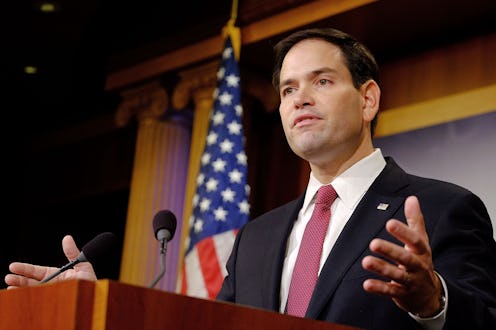News
Politicians, Stop Opposing The U.S.-Cuba Deal
When President Obama announced a new chapter in Cuba-U.S. relations on Wednesday, perhaps the most striking statement he made was: "I look forward to engaging Congress in an honest debate on lifting this embargo," seemingly steeling himself for the looming opposition from certain members of Congress. He was right. Both from the left and right, anti-Castro politicians strongly opposed the U.S.-Cuba deal.
In his speech about restoring relations with the communist state with which the U.S. has had a historically icy relationship, the president called the Cuban isolation "a failed policy." He said that with the release of Alan Gross, an aged American aid worker held in Cuba for the past five years, the U.S. will begin taking steps to change its Cuban policy — among which will entail setting up an embassy in Havana, releasing Cuban spies, and easing banking, and business and travel restrictions.
Following the pattern in which the president announces big policy changes and the GOP reacts accordingly (read: with opposition), Republicans have expressed strong dissent to the new policy. But Sen. Marco Rubio, a Florida Republican, has emerged as the leading voice of GOP opposition to a change in the U.S.' relations with Cuba. A Cuban American himself, Rubio expressed his displeasure over Obama's announcement on Fox News, saying:
It's absurd and it's part of a long record of coddling dictators and tyrants... Constantly giving away unilateral concessions ... in exchange for nothing.
Rubio also called the president "the worst negotiator" the country has had "since at least Jimmy Carter."
In fact, the Florida senator's opposition has been so stark that even soon-to-be Senate Majority Leader Mitch McConnell deferred to Rubio when asked about Cuba. When the GOP-led Senate comes into session on Jan. 6, Rubio will claim chairman position of the Foreign Relations Committee's subcommittee on the Western hemisphere, which means the young lawmaker will have considerable say in U.S. dealings in the region. This could prove difficult for the president, as Rubio said in his Fox News interview:
I’m committed to doing everything I can to unravel as many of these changes as possible... This Congress is not going to lift the embargo.
But a wave of opposition has also come from Obama's own party in the form of New Jersey Senator Bob Menendez. Like Rubio, Menendez is a Cuban American and a longtime critic of Cuba. While he commended the Gross' release, the outgoing Senate Foreign Relations Committee chair denounced the exchange of Cuban spies in return. He said in a statement:
President Obama's actions have vindicated the brutal behavior of the Cuban government... Trading Mr. Gross for three convicted criminals sets an extremely dangerous precedent. It invites dictatorial and rogue regimes to use Americans serving overseas as bargaining chips. I fear that today’s actions will put at risk the thousands of Americans that work overseas to support civil society, advocate for access to information, provide humanitarian services, and promote democratic reforms."
But what Rubio and Menendez don't take into account is that a continuation of Soviet-era policies are not only unrealistic in this day and age, it also has ceased to serve its intended purpose — that is, to pressure the Cuban government into an American mold. Rubio also represents the Cuban old guard, as Dana Milbank detailed in the Washington Post, with an steadfast but outdated position on Cuba.
A Florida International University poll published in June this year showed that a majority of Cuban Americans who responded had indicated that they would welcome a change in U.S-Cuban ties — more specifically, 68 percent favored re-establishing diplomatic relations, while 69 percent supported lifting travel restrictions. One of the chief conductors of the poll, Guillermo J. Grenier, said that there was:
A clear demographic shift with younger and more recently arrived Cubans favoring a change in policy toward the island.
The old policy of isolating Cuba has clearly failed to produce any substantive results. It has neither ended the Castro regime — Fidel, for the record, survived an alleged 600 assassination attempts — nor the human rights abuses in the country or lifted the suffering of the Cuban population. In his speech on Wednesday, Obama said:
I do not believe we can continue doing the same thing for five decades and expect a different result.
Which begs the question: Isn't it equally "absurd" to continue on with a policy that has had no discerning effect on a country except to be at its people's detriment, Sen. Rubio?
Images: Getty Images (3)
